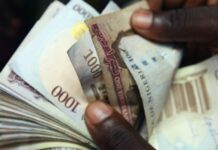The devaluation of the naira has increased Nigeria’s debt profile by N20.6trn trillion in five months, according to a report.
It adds that the new borrowing plans by the federal government will see the total debt level hit N89.2 trillion before the end of the year.
If shared to Nigeria’s 213 million people, each citizen will be owing N418,779 to the outside world.
The country’s total debt, both domestic and external, stood at $113.4 billion or N87.4 trillion as of June 30, according to a data sourced from the website of the Debt Management Office (DMO).
The amount is three times the size of the country’s debt in 2005 when the Paris Club forgave $18bn of that amount.
The Central Bank of Nigeria’s official exchange rate of US$1 to N770.38 as of June 30 was used in converting the external debt to naira by the DMO.
The domestic debt includes the N22.7 trillion Ways and Means Advances at the CBN for which the approval of the National Assembly (NASS) to securitize it was received in May 2023.
The Minister of Finance and Coordinating Minister for the Economy, Wale Edun, had, last month, at the World Bank/International Monetary Fund (IMF) annual meetings in Marrakech, Morroco, announced a plan by the government to obtain $1.5 billion in budget support from the World Bank.
This would, if granted, push the country’s debt stock to $114.9bn or N89.2trn, using the official exchange rate of N776.4/dollar.
This excludes the new plan to borrow $7.8bn and €100m which the president on Wednesday requested the Senate to approve as part of the 2022 – 2024
Following the devaluation of the portion of the debt owed to external creditors which is denominated in United States dollars, the total debt stock increased by N20.6 trillion as a result of the depreciation of about N315 per dollar in the Nigerian Autonomous Foreign Exchange Market (NAFEM) window from May 30th to date.











